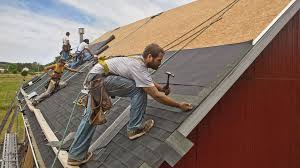Roofers generally provide warranties or guarantees for their work, but the length of time that these warranties or guarantees last can vary depending on a variety of factors. In this article, we will discuss some of the factors that can affect the length of time that roofers guarantee their work.
Types of Warranties
Before discussing the length of time that roofers guarantee their work, it is important to understand the different types of warranties that are available.
- Manufacturer’s Warranty: This warranty is provided by the manufacturer of the roofing material and covers defects in the material itself. These warranties can range from 20 to 50 years or more, depending on the type and quality of the roofing material.
- Workmanship Warranty: This warranty is provided by the roofer and covers any defects or problems that arise as a result of poor workmanship. These warranties can range from 1 to 10 years or more, depending on the roofer and the specific terms of the warranty.
- Combined Warranty: Some roofing companies may offer a combined warranty that covers both the roofing material and the workmanship. These warranties can range from 10 to 50 years or more, depending on the company and the specific terms of the warranty.
Factors That Affect the Length of Time of a Workmanship Warranty
- Roofer’s Reputation: Roofers with a good reputation for quality work and customer service may offer longer warranties to help build and maintain their reputation.
- Type of Roofing Material: The type of roofing material can affect the length of the warranty. For example, if the roofing material has a long lifespan, such as a metal roof, the warranty may be longer.
- Location: The location of the building can also affect the length of the warranty. If the building is located in an area with extreme weather conditions, such as heavy snow or strong winds, the warranty may be shorter due to the increased risk of damage.
- Contract Terms: The terms of the contract between the roofer and the client can also affect the length of the warranty. Some contracts may specify a shorter warranty period in exchange for a lower price, while others may specify a longer warranty period in exchange for a higher price.
- Maintenance Requirements: Some warranties may require regular maintenance to keep the warranty valid. For example, a roofer may require that the roof be inspected and maintained every year to keep the warranty in effect.
It is important to read the terms and conditions of the warranty carefully to understand what is covered and what is not covered, as well as any requirements for maintenance or repairs.
Factors That Affect the Length of Time of a Manufacturer’s Warranty
- Type of Roofing Material: The type and quality of the roofing material can affect the length of the warranty. Higher-quality roofing materials may have longer warranties.
- Manufacturer’s Reputation: Manufacturers with a good reputation for quality and customer service may offer longer warranties to help build and maintain their reputation.
- Location: The location of the building can also affect the length of the warranty. If the building is located in an area with extreme weather conditions, the warranty may be shorter due to the increased risk of damage.
- Contract Terms: The terms of the contract between the manufacturer and the client can also affect the length of the warranty. Some contracts may specify a shorter warranty period in exchange for a lower price, while others may specify a longer warranty period in exchange for a higher price.
Conclusion
Roofers generally provide warranties or guarantees for their work, but the length of time that these warranties or guarantees last can vary depending on a variety of factors. The length of the warranty may be affected by the roofer’s reputation, the type of roofing material, the location of the building.

